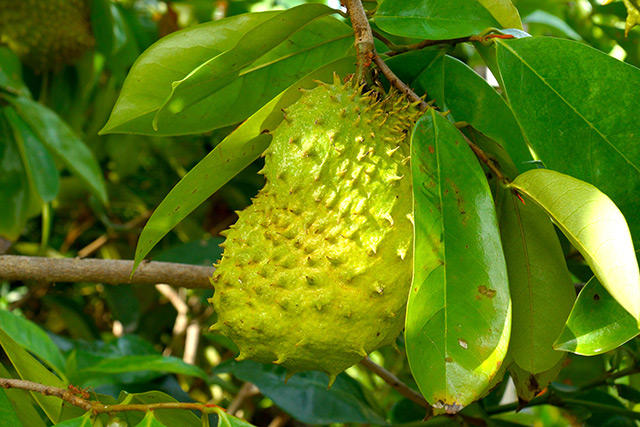Tropical "Soursop" plant found to kill cancer cells, reduce inflammation and fight infections

(Natural News) Annona muricata, also known as soursop, is a tropical plant known for its many medicinal uses. Traditionally, it is used to treat a variety of health problems, from simple fevers to serious diseases like diabetes and cancer.
According to studies, soursop is rich in phytochemicals that give it plenty of beneficial properties. These include antioxidant, anti-inflammatory, antibacterial and antifungal activities. In vivo studies also reveal that soursop has anxiolytic, immunomodulatory, antidepressant, hypoglycemic, hepatoprotective and anti-tumor properties.
In a study published in the Journal of Herbal Medicine, researchers from Universiti Putra Malaysia examined the cytotoxicity as well as the anti-tumor and antioxidant activities of various Annona muricata extracts, including an isolated acetogenin called annonacin, in vitro. They reported that soursop extracts obtained using different solvents all possessed anti-cancer properties, with annonacin showing the highest cytotoxicity against lymphoma cells. These findings serve as additional evidence of the anti-tumor potential of the traditional medicine, soursop.
Annona muricata extracts can kill cancer cells
Soursop belongs to the family Annonaceae, also known as the custard apple family. This fruit-bearing tree can be found in the tropical regions of Central and South America, Western Africa, Central and Eastern Africa, and Southeast Asia.
Several studies have looked into the chemical composition and therapeutic properties of the soursop plant. Researchers not only discovered a number of medicinal uses for its bark, fruits, leaves, roots and seeds, they also found a wealth of beneficial compounds in soursop. Of the more than 200 phytochemicals scientists have identified, the most important ones are alkaloids, phenols and acetogenins.
The power of the elements: Discover Colloidal Silver Mouthwash with quality, natural ingredients like Sangre de Drago sap, black walnut hulls, menthol crystals and more. Zero artificial sweeteners, colors or alcohol. Learn more at the Health Ranger Store and help support this news site.
Annonaceous acetogenins (ACGs) are compounds that can only be found in plants that belong to the Annonaceae family. ACGs are said to be responsible for the cytotoxicity shown by soursop extracts against cancer cells. ACGs are a type of fatty acid derivative that can inhibit a complex known as NADH-ubiquinone reductase. This complex is responsible for mitochondrial respiration and is believed to be involved in cancer development. According to studies, ACGs are selectively cytotoxic toward cancer cells but are not toxic to normal cells.
For their study, the researchers collected several soursop extracts and subjected them to the inhibition of Epstein-Barr virus early antigen (EBV-EA) activation assay. They used the tumor promoter 12-O-tetradecanoylphorbol 13-acetate (TPA) for induction on Raji cells (lymphoma cell line).
Before conducting the assay, the researchers first determined the cytotoxicity of each extract against Raji cells using the MTT assay. They also subjected the extracts to multiple radical scavenging assays to determine their antioxidant activity.
The researchers reported that annonacin showed remarkable cytotoxicity against Raji cells. Inhibition against EBV-EA activation occurred as follows: hexane leaf > annonacin > aqueous fruit > dichloromethane leaf > methane leaf > aqueous leaf > ethanol leaf.
The methanol leaf extract showed the highest antioxidant activity in all assays with an 87 percent radical scavenging rate. Meanwhile, annonacin had the lowest antioxidant activity in all the assays performed.
Based on these results, the researchers concluded that A. muricata extracts and annonacin have anti-tumor-promoting properties that make them promising natural anti-cancer agents.
Other health benefits of soursop
The soursop fruit is a nutritious and delicious fruit rich in fiber and vitamin C. It also contains minerals like potassium, iron and magnesium, and trace amounts of other vitamins like folate, niacin, riboflavin and thiamine. According to studies, soursop offers plenty of health benefits, such as: (Related: Soursop leaves may alleviate symptoms of fibromyalgia.)
- A rich source of antioxidants
- Fights bacterial infections
- Reduces inflammation
- Helps stabilize blood glucose levels
- Enhances immunity
- Reduces the risk of chronic diseases
Soursop is a versatile food that can easily be incorporated into any type of diet. To enjoy the health benefits of soursop, add it to smoothies or use it to sweeten desserts and baked goods. Soursop can also be made into tea or simply eaten as is.
Sources include:



